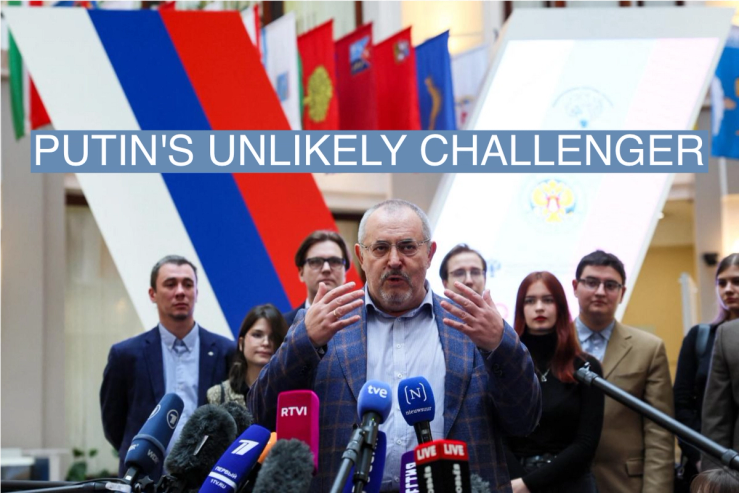The News
The Russian anti-war candidate Boris Nadezhdin has caused a stir in Russia’s upcoming presidential election – expected to be a closely managed victory lap for Vladimir Putin – after rallying the Russian opposition and gathering widespread support for his campaign to run against the country’s longtime leader.
Nadezhdin on Wednesday submitted more than 100,000 signatures to Russia’s election commission, which will assess their authenticity and decide within 10 days whether he is eligible to compete against Putin for the presidency in the March vote.
SIGNALS
Nadezhdin will likely be barred from running as Putin plans overwhelming victory
The election commission may prove to be a stumbling block for Nadezhdin, as it repeatedly has been for Russia’s opposition. The commission has previously barred a number of would-be candidates — including Alexsei Navalny in 2017 — from running against Putin on technicalities. One pro-peace opposition candidate who was building up steam in this year’s election was blocked from running in December due to errors in her nomination papers such as typos.
“The most likely scenario is that Nadezhdin will not be allowed to run,” one Russian journalist wrote in Carnegie Politika. “But his success will be noted by both the Russian establishment and the country’s silent opposition.” The election is expected to be closely managed, with sources close to the Kremlin telling Meduza, an independent Russian news outlet, that Putin wants to win with an 80% vote share.
Russia’s only anti-war candidate remains vague on the occupied territories
Nadezhdin has repeatedly called Russia’s invasion of Ukraine “Putin’s fatal mistake” and has said he would end the conflict on his first day as president and open talks over the country’s occupied territories. Even so, some of his positions remain controversial. When Georgian news outlet Sova asked Nadezhdin whether he considered the Russian-occupied territories of Ukraine to be part of Russia, he answered that “this is a matter of negotiations and a peace treaty,” adding that “the position of those who live in Crimea, Kherson and Zaporizhzhia” is more important than his own. Nadezhdin has previously said he has to follow Russian law when he speaks about the war in Ukraine. “If I didn’t, I would get into big trouble,” he told Politico. Russia has charged or detained thousands of people for expressing anti-war sentiments, according to the Russian human rights organization OVD-Info.
Insider background has led to accusations of collusion with Putin
The fact that Nadezhdin has even been allowed to come this far has led some Russian media outlets to speculate that he is coordinating with the Kremlin to provide an approved opposition candidate to help legitimize the election, the independent Russian outlet Current Time reported. These suspicions are strengthened by Nadezhdin’s ties to key Putin aide Sergei Kiriyenko, and his relationship with the broader Kremlin elite, with whom he is “on a first-name basis”, Politico reported, with Nadezhdin telling the outlet. “We’ve gone fishing, drunk tea with each other.” Nonetheless Nadezhdin has emphasized the fact that his opposition stance dates back to the early 2000s and said he has had no contact with the Putin administration about the election. He has also won the support of key opposition figures such as Aleksei Navalny and the exiled activist Maxim Katz.
Tatiana Stanovaya, an expert on Russian politics, told The Guardian that the Kremlin may have permitted Nadezhdin to collect signatures to “show the hopelessness of the anti-war agenda”, which may have been a mistake. “He was expected to play by the rules,” she said.



